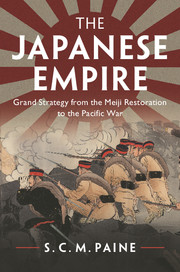Book contents
- Frontmatter
- Dedication
- Contents
- List of Maps
- Acknowledgments
- Maps
- 1 The Meiji Generation
- 2 The First Sino- Japanese War (1894– 1895)
- 3 The Russo- Japanese War (1904– 1905)
- 4 The Transition from a Maritime to a Continental Security Paradigm
- 5 The Second Sino- Japanese War (1931– 1941)
- 6 The General Asian War (1941– 1945)
- 7 Japan betwixt Maritime and Continental World Orders
- Select Bibliography
- Index
4 - The Transition from a Maritime to a Continental Security Paradigm
Published online by Cambridge University Press: 31 March 2017
- Frontmatter
- Dedication
- Contents
- List of Maps
- Acknowledgments
- Maps
- 1 The Meiji Generation
- 2 The First Sino- Japanese War (1894– 1895)
- 3 The Russo- Japanese War (1904– 1905)
- 4 The Transition from a Maritime to a Continental Security Paradigm
- 5 The Second Sino- Japanese War (1931– 1941)
- 6 The General Asian War (1941– 1945)
- 7 Japan betwixt Maritime and Continental World Orders
- Select Bibliography
- Index
Summary
I believe few countries’ politicians’ lives are in such danger as ours are in Japan … Military men are fond of saying, “We risk our lives for society.” … [M]ilitary men, particularly those of higher rank … have few opportunities to die in war … Looking back, I think one can safely say that since the Restoration there have hardly been any politicians equivalent to four-star generals and field marshals who have not become targets of assassins.
Ozaki Yukio (1858–1954), Diet member from 1890 to 1954, Cabinet ministerThe Industrial Revolution brought trade of global scope and wealth of unimaginable scale. It heralded an incoming maritime world order, which gradually supplanted the outgoing continental world order of empires underlying so many great civilizations. Formerly, land had been the currency of power. It produced the agricultural commodities to be sold and the peasant conscripts to field mass armies. In the nineteenth century, commerce became the juggernaut of wealth creation, which in turn underwrote high standards of living and expensive ambitions, armaments, and allies. The Meiji generation lived at the transition between two global orders but they charted a course to the outgoing one, then at high tide, because they and so many others did not yet apprehend the incoming one just beyond the horizon. It is only with the perspective provided by long retrospect that such tectonic changes become clearer. At the time, people saw great change but not its cumulative direction.
Continental and maritime powers face different security problems that have far-reaching military, economic, and political ramifications. Continental powers border on their historic enemies, which pose their most lethal national security threats. The more numerous the potentially dangerous neighbors, the more difficult the problem of national security becomes. Continental powers require large standing armies to ward off neighboring threats. They do so often by deploying their armies to dominate surrounding buffer zones, which over time become national territory so that the army assumes a crucial domestic garrisoning function. Large standing armies also tend to have a palpable presence in the capital, where they often exercise great political influence. They tend to support economic policies that fund the army, produce conscripts, and efficiently exploit buffer zones for military purposes; as a result, they often favor extensive state planning.
- Type
- Chapter
- Information
- The Japanese EmpireGrand Strategy from the Meiji Restoration to the Pacific War, pp. 77 - 108Publisher: Cambridge University PressPrint publication year: 2017



